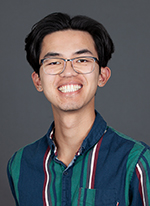As my time as a Graduate Fellow ends, the staff asked me to reflect on my experience at Trellis Foundation in this exit interview post. The Trellis Foundation fellowship is a great chance to gain practical experience and learn about the interactions and intersections between nonprofit and philanthropic sectors.
What drew you to Trellis Foundation’s graduate fellowship?
I was interested in the Trellis Foundation fellowship because their work overlaps my academic and professional interests in postsecondary career prep and education policy. I came to postsecondary prep and education policy through my lived experiences. Watching my first-generation friends and family struggle to understand life and the education system post-graduation was incredibly formative, so working at an organization that directly funds programs that help families navigate this felt like a no-brainer for me.
Working with a grantmaking organization was also a unique experience since my experience has mainly been on the grantee side. Although I previously worked at an educational nonprofit, I found that philanthropy is necessary for organizations like that one to continue.
What was the most rewarding part of working with Trellis Foundation over the past year?
The most rewarding thing is being able to see tangible results of our grantees and the impact they have on their communities. Our work with community colleges is particularly compelling, as we see the increase in enrollment numbers and student persistence to an associate degree directly through our program funding. In addition, it was exciting to see various projects and their learnings before anyone else. Very rarely do you get to experience that feeling in a professional setting.
Tell us something new you learned or a skill you developed during your fellowship that will help you professionally.
It’s more conceptual, but I learned what it takes to run a foundation: constant field research to find best practices, community building with potential partners, and the daily operations that academia can’t prepare you for. School teaches us the individual responsibilities demanded of us in digestible bites over time, each with a week-long unit solely focused on one topic. But in the field, the duties are dynamic and constantly happening simultaneously. I also learned how to craft better grant proposals, reports, and takeaways from a grantee’s perspective. That’s one thing you can’t comprehend or learn until you’re doing it.
What do you believe the next step is in your career path, and how has this fellowship contributed to your journey?
After this, I plan to teach for a year or two. Later, I plan on taking my experience from Trellis to pitch my own project proposals to philanthropies, foundations, and other grantmakers. I would love to focus on improving high school education by incorporating more hands-on learning experiences and emphasize well-rounded learning rather than being typecast into career paths. Before Trellis, I did not believe I would ever be able to start a nonprofit, but now that I better understand the intricacies, I am more comfortable in my ability to begin this journey.
What advice would you give a new Trellis Foundation Graduate Fellow?
There are no bad questions, whether to your coworkers (who are more than happy to answer) or to yourself, when reviewing reports, proposals, and new practices. By taking time to understand the underlying conditions of their projects, you gain deeper insight into the field and organizational decision-making. When you ask questions, there are more opportunities to learn!
And that’s a wrap! I’m so grateful to the Foundation team; they welcomed me with warm arms and were my guides in a new experience while giving me ample space to grow. And a thank you to the grantees who welcomed me into their work and community.
About the Author

Johnathan Cheung is recent graduate of the LBJ School of Public Affairs at the University of Texas at Austin. He focuses on education policy, with an emphasis on the intersection of equitable access through poverty alleviation and completion of post-secondary studies through educational intervention. Previously, Johnathan worked at an educational non-profit as an AmeriCorps member and a policy intern at District C in the City of Houston for Councilwoman Ellen Cohen.
He also holds a Bachelor of Science in Political Science from the University of Houston.

